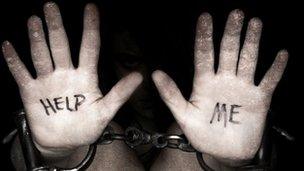Bill to make Scotland 'hostile' for people traffickers
- Published
A victim of trafficking, who came to Scotland from Uganda, has been speaking about his ordeal
New legislation to tackle human trafficking is to be introduced by the Scottish government.
It will build on the work done by Labour MSP Jenny Marra who had proposed her own bill.
She said it could mean Scotland would have some of the world's most robust and effective legislation on trafficking.
Justice Secretary Kenny MacAskill said the government's bill would make Scotland "hostile" for traffickers.
The Human Trafficking Bill is aimed at strengthening the existing law - giving an improved definition of the offence to help police and prosecutors tackle the problem.
It is estimated there are currently five people in prison in Scotland, convicted of human trafficking.
But in 2013, a total of 99 people were referred to agencies as potential victims - 22 of them under the age of 18.
Mr. MacAskill has visited a "safe house" operated by the charity Migrant Help where victims of trafficking can find refuge.
Sex act
One of the victims, a gay Ugandan man whose name is being protected, has told how he left his country after his mother was killed when a mob burned down her house, angry at her son's sexuality.
John - not his real name - said he paid a man $3,000 to help him leave Uganda, then flew to Scotland.
He was locked in a room for a fortnight until he was taken for a drive by a white man.
"About an hour into the drive, this gentleman asks me if I can perform a sexual act on him," he told BBC Scotland.
He said he was bewildered and refused, which made the driver angry.
"He was like 'You mean I have paid £200 for you, and I'm not going to get any action?' Those were his words exactly."
John escaped from the car, and fled, spending a night on the streets before he was able to find help.
Mr. MacAskill said such trafficking was a heinous crime.
"Hearing first-hand the terrible histories victims of trafficking have, only serves to reinforce the need for robust legislation to allow our police and prosecutors greater powers, to detect and prosecute those who seek to make money from human misery."
He added: "Ultimately we are determined to develop legislation that gives our police, prosecutors and other agencies the powers to make Scotland a hostile environment for human traffickers, but also helps to identify and support the needs of victims."
'Most robust'
The proposed government bill develops the work of Labour's Jenny Marra who put forward her own bill designed to define the crime of trafficking in Scotland for the first time, enshrining the UN's Palermo Protocol, which looks to prevent, suppress and punish trafficking, into Scots law.

Ministers said the proposed legislation would make Scotland "a hostile environment" for traffickers
It would also help stop the criminalisation of victims by making it illegal to punish those who have been forced to commit crime as a result of their trafficking.
The government bill is unlikely to include that provision, but Ms Marra welcomed the action by ministers.
She told BBC Scotland: "I am very pleased the government is to bring forward a bill based on the work I have been doing.
"If fully implemented, Scotland will end up with some of the most robust and effective anti-trafficking laws in the world."
Robert McCrea, chief executive officer of Migrant Help, said the proposed legislation would put the interests of victims to the fore.
"Victims' support has always been caring and sophisticated," he said.
"Therefore we understand why the Scottish government would wish to formalise this work by compounding the best practice and experience into a bill proposal."
The UK government has published a Modern Slavery Bill to tackle human trafficking, which will increase sentences for offenders who enslave others into a single act.
Ministers say this is in addition to other non-legislative action being taken, for example at the UK border and working with source countries to prevent people becoming victims of trafficking in the first place.
- Published17 March 2014
- Published11 September 2013
- Published2 April 2013
- Published14 October 2012